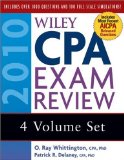Difference Between CPA and CMA
The corporate world has become extremely competitive in the past few years. Nowadays, it is no longer enough that a person holds an undergraduate or graduate diploma. For many, getting a certification can spell the difference between getting ahead in the corporate world, and getting passed off by potential employers.
CPA and CMA are just two of the certifications in which an accountant may show interest after graduating from university. Although they would be able to get a stable job without being certified, accountants who have taken and passed either a CPA or CMA certification have a higher chance in getting higher paying jobs than non-certified accountants. If you are an accountant, and find yourself having a hard time deciding which of the two certifications to take, continue reading to learn more about them.
CPA, which stands for Certified Public Accountant, is the more popular certification between the two. It is also the most widely accepted and accredited certification for an accountant. A CPA mostly handles tasks such as auditing, taxes, and preparing financial statements to ensure that an individual or company is able to meet the legal financial requirements mandated by local government agencies. CMA, on the other hand, stands for Certified Management Accountant. Accountants that receive this certification are more adept in handling responsibilities pertaining to financial management, analysis and strategies. On top of that, CMA certified accountants are also expected to have the ability to lead employees, and have enough business know-how to allow the company or organization to prosper.
Another difference between the CPA and CMA certifications, are the requirements needed to qualify for the exams. Both the CPA and CMA require applicants to have completed an undergraduate academic degree program in Accountancy. On top of this, CMA applicants must have also passed the Graduate Management Admission Test, or GMAT. In most countries, CPA certification applicants do not need to have any previous work experience to qualify for the exam. However, CMA applicants are required to present proof that they have had at least two years working experience before they will be allowed to take the exam.
Finally, there is the difference in work opportunities. While being certified as either a CPA or CMA increases your chances to be employed in higher paying jobs than most other applicants, the CPA certification covers an extremely broad scope, and merely focuses on the auditing skills and knowledge of the tax and financial laws in a particular state or country. On the other hand, CMA accountants are more specialized. Apart from being able to provide the same services of a CPA, they have also been certified as valuable leaders within an organization or corporation. For this reason, CMA accountants are able to rise up the corporate ladder faster, and will often form part of top management personnel.
Summary
1. CPA and CMA are certifications that an accountant may take in order to qualify for better and higher paying work opportunities.
2. The examination of the CPA certification focuses on auditing, and the knowledge of tax and financial laws. CMA certification exams centers on gauging the financial management, analysis and strategizing abilities of the applicant.
3. The CMA certification is more specific than the CPA certification, which is why there are many more requirements to be met by an accountant in order to be qualified to take this certification exam.
- Difference Between Schizophrenia and Psychosis - March 7, 2024
- Difference Between African and Asian Elephants - March 7, 2024
- Difference Between Sunscreen and Sunblock - February 15, 2024


I qualify to take the exam based on my education but do not meet the work experience for the CMA certification. I know I can complete the certification within 7 years but once I complete both exams, can I indicate that I have taken and passed the CMA exams but lack work experience on my resume? If so how will that look to potential employers and will it help me get a job? I am looking for a financial analyst position or something similar. My fear is that I will pay for everything, pass everything, and still will not be able to find a job. Your thoughts are appreciated. If you can please email me your response that would be great.
If you pass this exam, finding a job won’t be that hard. You might have to take the less salary in the beginning but chances are you will get the job. I am pursing my CPA and not even thinking about CMA. I think one certification is enough to open the doors and then get the max out of experience .
I have both CPA and CMA designations, and am in public accounting – both tax and audit. The CPA designation is far and away the better credential. Everyone in business knows what a CPA is, hardly anyone knows the CMA. Over my 20 years as a CPA and CMA, no client has ever asked me about my CMA.
Another difference: CPA is a state license, issued by a state board of accountancy under your state’s laws. CMA is a private certificate given the Institution of Management Accountants.
The CMA certificate, launched in the mid-1970s, was expected to be on par with the CPA certificate by the mid-1980s, in terms of prestige (and certificate holders). The CMA was supposed to be the answer to accounting professionals who were not in public accounting to still get a professional designation. But it never happened: The MBA degree exploded in popularity in the 1980s – many finding it much more recognized and marketable in private accounting than the CMA. Then in the early 2000s, states began offering a pathway for people to get licensed as a CPA without public accounting auditing experience – thus taking away the last advantage the CMA may have had over the CPA.
Nevertheless, I am still glad I got both. But hands-down, the CPA wins.